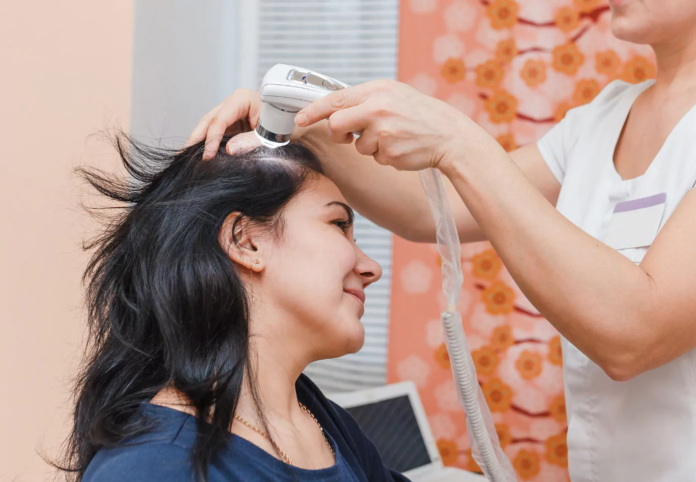Hair loss can be emotionally distressing and physically visible, affecting not just scalp health but also an individual’s self-esteem. With a variety of causes ranging from hormonal imbalances and nutritional deficiencies to stress and genetic predispositions, accurate diagnosis and targeted treatment are crucial. A professional trichologist plays a key role in understanding these underlying causes and offering precise therapies. When consulting the Best Trichologist In Dubai, individuals benefit from tailored, evidence-based solutions that focus on long-term hair recovery and scalp health.
Understanding the Role of a Trichologist
A trichologist is a trained expert in hair and scalp disorders. Their focus ranges from diagnosing hair fall and dandruff to managing conditions like alopecia areata and seborrheic dermatitis.
- Specializes in hair and scalp health.
- Addresses medical and non-medical causes of hair loss.
- Differentiates between scarring and non-scarring alopecia.
Importance of Accurate Diagnosis
Before any treatment begins, identifying the root cause of hair loss is fundamental. This step ensures that interventions are targeted and effective.
- Performs scalp analysis and hair pull tests.
- May recommend lab tests for hormones or nutrition.
- Avoids generic treatment; provides customized care.
Major Causes of Hair Loss Trichologists Treat
Hormonal Imbalance and Hair Thinning
Conditions like PCOS, thyroid dysfunction, and post-pregnancy changes lead to hormonal hair fall. Trichologists detect these through specific assessments.
- Androgenic alopecia is common in both genders.
- Hormone-related loss may need lifestyle alignment.
- Early detection helps in proactive care.
Stress-Induced Shedding
Emotional or physical stress can push hair into the shedding phase prematurely. This condition, known as telogen effluvium, is reversible with proper guidance.
- Trichologists monitor stress history and sleep patterns.
- Suggest relaxation techniques and scalp-soothing treatments.
- Focus on regrowth timelines and cycle restoration.
Effective Techniques Used by the Best Trichologist
Scalp Microscopy and Trichoscopy
Using dermatoscopic imaging, trichologists inspect the scalp and hair follicle status for better diagnosis.
- Detects miniaturization of follicles.
- Helps visualize inflammation and scaling.
- Guides treatment planning for visible scalp conditions.
Scalp Detox and Exfoliation
Cleansing clogged follicles and removing debris enhances hair growth by improving follicle breathing.
- Removes sebum buildup and dead skin.
- Stimulates circulation to follicles.
- Enhances product absorption.
Customized Hair Serums and Topicals
The Best Trichologist prescribes specific serums targeting individual scalp issues, often containing peptides, minoxidil, or caffeine extracts.
- Stimulates dormant follicles.
- Improves density and strand strength.
- Applied through mesotherapy or microneedling.
Advanced Treatment Options in Trichology
Platelet-Rich Plasma (PRP) for Hair Growth
PRP is derived from the patient’s blood and injected into the scalp to stimulate dormant follicles.
- Contains growth factors that activate follicle repair.
- Increases hair diameter and density.
- Non-invasive and widely researched.
Low-Level Laser Therapy (LLLT)
A non-thermal light therapy that promotes hair regrowth by stimulating mitochondria in scalp cells.
- Improves blood circulation.
- Encourages follicle cell proliferation.
- Suitable for both men and women.
Microneedling with Growth Factors
Using tiny needles, the scalp is punctured to allow absorption of growth serums and to induce natural healing.
- Enhances collagen production around follicles.
- Improves topical effectiveness.
- Often combined with peptides or plant-based serums.
Holistic and Preventive Approaches by Trichologists
Scalp Massage and Blood Flow Stimulation
Gentle massage boosts blood circulation, helping nutrients reach the hair roots.
- Encourages follicular activation.
- Reduces tension in scalp muscles.
- Increases the efficacy of topicals.
Stress Management Techniques
Hair health improves when overall mental and physical stress is reduced.
- Recommendations include yoga and meditation.
- Adequate sleep and breathing exercises are encouraged.
- Trichologists promote balanced cortisol levels.
Common Hair Loss Conditions Managed by Trichologists
| Hair Loss Type | Cause | Treatment Focus |
|---|---|---|
| Androgenic Alopecia | Hormonal imbalance | PRP, topicals, nutrition |
| Telogen Effluvium | Iron, vitamin D, and biotin deficiency | Stress control, dietary support |
| Alopecia Areata | Autoimmune | Anti-inflammatory topical support |
| Traction Alopecia | Hairstyling tension | Scalp relaxation, follicle repair |
| Nutritional Shedding | Iron, vitamin D, biotin deficiency | Supplementation, scalp therapy |
Diagnostic Tools Used by Trichologists
| Diagnostic Method | Purpose | Insight Provided |
|---|---|---|
| Scalp Analysis | Visual examination | Redness, dryness, flaking |
| Trichoscopy | Dermatoscopic imaging | Follicle shape, hair shaft damage |
| Hair Pull Test | Physical assessment | Shedding rate |
| Blood Tests | Nutrient and hormonal screening | Underlying imbalances |
| Growth Tracking Logs | Treatment effectiveness monitoring | Progress trends over time |
FAQ’s
1. What is the difference between a trichologist and a dermatologist?
A trichologist focuses solely on hair and scalp disorders, while dermatologists treat skin, nails, and hair. Trichologists provide non-invasive, hair-centric therapies.
2. Can a trichologist treat hereditary hair loss?
Yes, hereditary conditions like male or female pattern baldness are managed with customized regimens, which may include growth stimulants and topical applications.
3. How soon can I see results after treatment starts?
Visible improvement often begins around 8–12 weeks, depending on the type of hair loss and the individual’s biology and adherence to the regimen.
4. Is hair regrowth always guaranteed?
Hair regrowth depends on the cause and severity of hair loss. While many cases respond well to treatment, some conditions require ongoing maintenance.
5. Can I prevent hair loss by seeing a trichologist early?
Absolutely. Early intervention helps reduce permanent damage, especially for shedding caused by stress, styling, or nutritional gaps.
Conclusion
Effective hair loss management is not about quick fixes—it’s about personalized, consistent, and well-informed care. The Best Trichologist brings a blend of clinical insights, advanced technology, and holistic wellness to target the root causes of hair fall. Whether you’re struggling with sudden shedding, thinning, or chronic conditions, their expertise helps foster healthy hair regrowth through a tailored strategy.
































